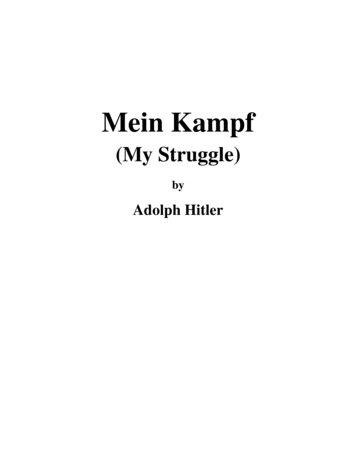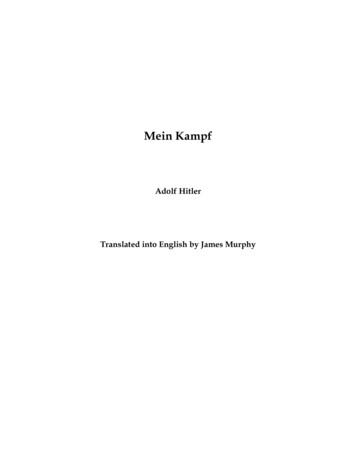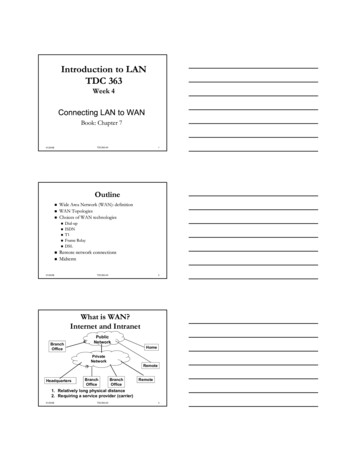
Transcription
Mein Kampf(My Struggle)byAdolph Hitler
Mein Kampf (My Struggle)by Adolph HitlerFairborne PublishingThe Colchester r's magnum opus is as unread as it is infamous. While billions of words have been spilled onthe subject of Hitler and his intentions, few have ever bothered to read the words of the manhimself.The shrill consistency of the winners who wrote history is evidence of hegemonic conditioning.That consistency is only matched by the consistency of Hitler himself. Over the following twodecades, his actions remained true to the words written circa 1924 26. To understand whetherHitler was a demon, a hero, or something else altogether, it is necessary to compare his actions tothe words written in this book.Copyright: Many works published by the Colchester Collection are in the Public Domain. Someworks in the collection are protected by copyright in some countries. All copyright claims inthese pages, by the Colchester Collection, apply, solely, to those copyrightable expressions ofideas (summaries, web design, graphics, etc.) created by the Colchester Collection or itsemployees. All rights to works under copyright are reserved to the copyright holder. TheColchester Collection makes no claim to copy protections on the copyrighted works of others.These works are published as a public service, under the terms of the Fair Use provisions of UScopyright law.
Table of ContentsForeword . . . . . . . . . . . . . . . . . . . . . . . . . . . . . . . . . . . . . . . . . . . . . . . . . . . . . . . . . . . . . . . . . . .6Volume I:A Reckoning . . . . . . . . . . . 8Chapter 1:In the House of My Parents . . . . . . . . . . . . . . . . . . . . . . . . . . . . . . . . . . . . . . . . . . . . . . . . . . . . . . .9Chapter 2:Years of Study and Suffering in Vienna . . . . . . . . . . . . . . . . . . . . . . . . . . . . . . . . . . . . . . . . . . . . .24Chapter 3:General Political Considerations Based on My Vienna Period . . . . . . . . . . . . . . . . . . . . . . . . . . . . 70Chapter 4:Munich . . . . . . . . . . . . . . . . . . . . . . . . . . . . . . . . . . . . . . . . . . . . . . . . . . . . . . . . . . . . . . . . . . . . . . 130Chapter 5:The World War . . . . . . . . . . . . . . . . . . . . . . . . . . . . . . . . . . . . . . . . . . . . . . . . . . . . . . . . . . . . . . . . 161Chapter 6:War Propaganda . . . . . . . . . . . . . . . . . . . . . . . . . . . . . . . . . . . . . . . . . . . . . . . . . . . . . . . . . . . . . . . 179Chapter 7:The Revolution . . . . . . . . . . . . . . . . . . . . . . . . . . . . . . . . . . . . . . . . . . . . . . . . . . . . . . . . . . . . . . . . 189Chapter 8:The Beginning of My Political Activity . . . . . . . . . . . . . . . . . . . . . . . . . . . . . . . . . . . . . . . . . . . . . 208Chapter 9:The “German Workers' Party” . . . . . . . . . . . . . . . . . . . . . . . . . . . . . . . . . . . . . . . . . . . . . . . . . . . . 217Chapter 10:Causes of the Collapse . . . . . . . . . . . . . . . . . . . . . . . . . . . . . . . . . . . . . . . . . . . . . . . . . . . . . . . . . . 225Chapter 11:Nation and Race . . . . . . . . . . . . . . . . . . . . . . . . . . . . . . . . . . . . . . . . . . . . . . . . . . . . . . . . . . . . . . . 281
Chapter 12:The First Period of Development of the National Socialist German Workers' Party . . . . . . . . . . . 326Volume II:The National Socialist Movement . . . . . . . . . . . 365Chapter 1:Philosophy and Party . . . . . . . . . . . . . . . . . . . . . . . . . . . . . . . . . . . . . . . . . . . . . . . . . . . . . . . . . . . 366Chapter 2:The State . . . . . . . . . . . . . . . . . . . . . . . . . . . . . . . . . . . . . . . . . . . . . . . . . . . . . . . . . . . . . . . . . . . . . 381Chapter 3:Subjects and Citizens . . . . . . . . . . . . . . . . . . . . . . . . . . . . . . . . . . . . . . . . . . . . . . . . . . . . . . . . . . . 438Chapter 4:Personality and the Conception of the Folkish State . . . . . . . . . . . . . . . . . . . . . . . . . . . . . . . . . . . 442Chapter 5:Philosophy and Organization . . . . . . . . . . . . . . . . . . . . . . . . . . . . . . . . . . . . . . . . . . . . . . . . . . . . . 453Chapter 6:The Struggle of the Early Period – The Significance of the Spoken Word . . . . . . . . . . . . . . . . . . 465Chapter 7:The Struggle with the Red Front . . . . . . . . . . . . . . . . . . . . . . . . . . . . . . . . . . . . . . . . . . . . . . . . . . 483Chapter 8:The Strong Man Is Mightiest Alone . . . . . . . . . . . . . . . . . . . . . . . . . . . . . . . . . . . . . . . . . . . . . . . . 509Chapter 9:Basic Ideas Regarding the Meaning and Organization of the SA . . . . . . . . . . . . . . . . . . . . . . . . . 520Chapter 10:Federalism as a Mask . . . . . . . . . . . . . . . . . . . . . . . . . . . . . . . . . . . . . . . . . . . . . . . . . . . . . . . . . . . 558Chapter 11:Propaganda and Organization . . . . . . . . . . . . . . . . . . . . . . . . . . . . . . . . . . . . . . . . . . . . . . . . . . . . 583Chapter 12:The Trade Union Question . . . . . . . . . . . . . . . . . . . . . . . . . . . . . . . . . . . . . . . . . . . . . . . . . . . . . . . 601
Chapter 13:German Alliance Policy After the War . . . . . . . . . . . . . . . . . . . . . . . . . . . . . . . . . . . . . . . . . . . . . . 614Chapter 14:Eastern Orientation or Eastern Policy . . . . . . . . . . . . . . . . . . . . . . . . . . . . . . . . . . . . . . . . . . . . . . . 651Chapter 15:The Right of Emergency Defense . . . . . . . . . . . . . . . . . . . . . . . . . . . . . . . . . . . . . . . . . . . . . . . . . . 677Conclusion . . . . . . . . . . . . . . . . . . . . . . . . . . . . . . . . . . . . . . . . . . . . . . . . . . . . . . . . . . . . . . . . . . 697
ForewordOn November 9, 1923, at 12:30 in the afternoon, in front of theFeldherrnhalle as well as in the courtyard of the former WarMinistry the following men fell, with loyal faith in theresurrection of their people:Alfarth, Felix, businessman, b. July 5, 1901Bauriedl, Andreas, hatter, b. May 4, 1879Casella, Theodor, bank clerk, a. August 8, 1900Ehrlich, Wilhelm, bank clerk, b. August 19, 1894Faust, Martin, bank clerk, b. January 27, 1901Hechenberger, Anton, locksmith, b. September 28, 1902Korner, Oskar, businessman, b. January 4, 1875Kuhn, Karl, headwaiter, b. July 26, 1897LaForce, Karl, student of engineering, b. October 28, 1904Neubauer, Kurt, valet, b. March 27, 1899Pape, Claus Von, businessman, b. August 1, 1904Pfordten, Theodor Son Der, county court councillor, b. May 14,1873Rickmers, Johann, retired cavalry captain, b. May 7, 1881Scheubner Richter, Max Erwin Von, doctor of engineering, b.January 9, 1884Stransky, Lorenz, Ritter Von, engineer, b. March 14, 1889Wolf, Wilhelm, businessman, a. October 19, 1898So called national authorities denied these dead heroes acommon grave.Therefore I dedicate to them, for common memory, the firstvolume of this work. As its blood witnesses, may they shineforever, a glowing example to the followers of our movement.
Adolf HitlerLandsberg Am LechFortress PrisonOctober 16, 1924
Volume I:A Reckoning
Chapter1:In the House of My ParentsToday it seems to me providential that Fate should have chosenBraunau on the Inn as my birthplace. For this little town lies onthe boundary between two German states which we of theyounger generation at least have made it our life work to reuniteby every means at our disposal.German Austria must return to the great German mother country,and not because of any economic considerations. No, and againno: even if such a union were unimportant from an economicpoint of view; yes, even if it were harmful, it must neverthelesstake place. One blood demands one Reich. Never will theGerman nation possess the moral right to engage in colonialpolitics until, at least, it embraces its own sons within a singlestate. Only when the Reich borders include the very last German,but can no longer guarantee his daily bread, will the moral rightto acquire foreign soil arise from the distress of our own people.Their sword will become our plow, and from the tears of war thedaily bread of future generations will grow. And so this little cityon the border seems to me the symbol of a great mission. And inanother respect as well, it looms as an admonition to the presentday. More than a hundred years ago, this insignificant place hadthe distinction of being immortalized in the annals at least ofGerman history, for it was the scene of a tragic catastrophe whichgripped the entire German nation. At the time of our fatherland'sdeepest humiliation, Johannes Palm of Nuremberg, burgher,bookseller, uncompromising nationalist and French hater, diedthere for the Germany which he loved so passionately even in hermisfortune. He had stubbornly refused to denounce hisaccomplices who were in fact his superiors. In thus he resembledLeo Schlageter. And like him, he was denounced to the French
by a representative of his government An Augsburg police chiefwon this unenviable fame, thus furnishing an example for ourmodern German officials in Herr Severing's Reich.In this little town on the Inn, gilded by the rays of Germanmartyrdom, Bavarian by blood, technically Austrian, lived myparents in the late eighties of the past century; my father a dutifulcivil servants my mother giving all her being to the household,and devoted above all to us children in eternal, loving care Littleremains in my memory of this period, for after a few years myfather had to leave the little border city he had learned to love,moving down the Inn to take a new position in Passau, that is, inGermany proper.In those days constant moving was the lot of an Austrian customsofficial. A short time later, my father was sent to Linz, and therehe was finally pensioned. Yet, indeed, this was not to mean "res"'for the old gentleman. In his younger days, as the son of a poorcottager, he couldn't bear to stay at home. Before he was eventhirteen, the little boy laced his tiny knapsack and ran away fromhis home in the Waldviertel. Despite the at tempts of'experienced' villagers to dissuade him, he made his way toVienna, there to learn a trade. This was in the fifties of the pastcentury. A desperate decision, to take to the road with only threegulden for travel money, and plunge into the unknown. By thetime the thirteen year old grew to be seventeen, he had passedhis apprentice's examination, but he was not yet content. On thecontrary. The long period of hardship, endless misery, andsuffering he had gone through strengthened his determination togive up his trade and become ' something better. Formerly thepoor boy had regarded the priest as the embodiment of allhumanly attainable heights; now in the big city, which had sogreatly widened his perspective, it was the rank of civil servant.With all the tenacity of a young man whom suffering and carehad made 'old' while still half a child, the seventeen year oldclung to his new decision he did enter the civil service. And afternearly twenty three years, I believe, he reached his goal. Thus heseemed to have fulfilled a vow which he had made as a poor boy:that he would not return to his beloved native village until he had
made something of himself.His goal was achieved; but no one in the village could rememberthe little boy of former days, and to him the village had grownstrange.When finally, at the age of fifty six, he went into retirement, hecould not bear to spend a single day of his leisure in idleness.Near the Upper Austrian market village of Lambach he bought afarm, which he worked himself, and thus, in the circuit of a longand industrious life, returned to the origins of his forefathers.It was at this time that the first ideals took shape in my breast.All my playing about in the open, the long walk to school, andparticularly my association with extremely 'husky' boys, whichsometimes caused my mother bitter anguish, made me the veryopposite of a stay at home. And though at that time I scarcelyhad any serious ideas as to the profession I should one daypursue, my sympathies were in any case not in the direction ofmy father's career. I believe that even then my oratorical talentwas being developed in the form of more or less violentarguments with my schoolmates. I had become a little ringleader;at school I learned easily and at that time very well, but wasotherwise rather hard to handle. Since in my free time I receivedsinging lessons in the cloister at Lambach, I had excellentopportunity to intoxicate myself with the solemn splendor of thebrilliant church festivals. As was only natural the abbot seemedto me, as the village priest had once seemed to my father, thehighest and most desirable ideal. For a time, at least, this was thecase. But since my father, for understandable reasons, provedunable to appreciate the oratorical talents of his pugnacious boy,or to draw from them any favorable conclusions regarding thefuture of his offspring, he could, it goes without saying, achieveno understanding for such youthful ideas. With concern heobserved this conflict of nature.As it happened, my temporary aspiration for this profession wasin any case soon to vanish, making place for hopes more stated tomy temperament. Rummaging through my father's library, I hadcome across various books of a military nature among them a
popular edition of the Franco German War of 1870 7I Itconsisted of two issues of an illustrated periodical from thoseyears, which now became my favorite reading matter It was notlong before the great heroic struggle had become my greatestinner experience. From then on I became more and moreenthusiastic about everything that was in any way connected withwar or, for that matter, with soldiering But in another respect aswell, this was to assume importance for me. For the first time,though as yet in a confused form, the question was forced uponmy consciousness: Was there a difference and if so whatdifference betwee
Hitler's magnum opus is as unread as it is infamous. While billions of words have been spilled on the subject of Hitler and his intentions, few have ever bothered to read the words of the man himself.











